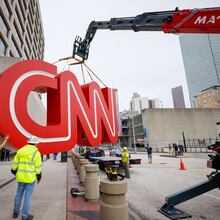Wall Street sank Tuesday as a supersized early gain completely evaporated.
The losses were led by companies that have been investor favorites including Microsoft, Apple and Amazon.
The S&P 500 fell 0.5% Tuesday and the Nasdaq, which is dominated by tech companies, fell 1.4%. Small-company stocks, which took a beating in the sell-off that swept markets the last several weeks, ended higher.
Other winning stocks included shopping mall owners, travel companies and other businesses that stand to benefit from economies reopening.
The price of oil swung wildly again as concerns remain about crashing demand and a lack of storage space.
Tuesday’s losses snapped the market’s two-day winning streak.
The S&P 500 index fell 15.09 points, or 0.5%, to 2,863.39.
The Dow Jones Industrial Average dropped 32.23 points, or 0.1%, to 24,101.55.
The Nasdaq slid 122.43 points, or 1.4%, to 8,607.73.
The Russell 2000 index of smaller company stocks picked up 16.20 points, or 1.3%, to 1,298.08.
The day began in very positive territory Tuesday, extending an upward trajectory for stocks as investors began to see more positive signs to gradually reopening state economies in the age of coronavirus.
All U.S. market indexes appeared to be on their way to another winning day despite a steady drumbeat of tough economic news, like 4 million new jobless claims and the unprecedented crash of oil markets.
At the opening bell, the Dow Jones Industrial Average was up more than 300 points.
The market has looked bullish at times, but any gains made during the outbreak have been fleeting, as Tuesday demonstrated, with investors wary about what the future holds, but still clinging to hope that government stimulus efforts will hold up the economy until business returns full speed.
From Rome, Georgia, to Rome, Italy, companies are watching as politicians detail plans to ease up on restrictions that were meant to slow the coronavirus pandemic but also have erased businesses and jobs.
A day earlier, banks, retail stores, travel companies and other businesses that stand to gain the most from people re-emerging from their homes jumped to the biggest gains.
What’s next
The U.S. Federal Reserve is holding its own monetary policy meeting Tuesday and Wednesday, though it is not expected to add to the huge amounts of stimulus it has already deployed, though investors will be keen for more detail on the economic outlook.
With central banks and governments promising huge amounts of aid for the economy, some investors are focusing on the potential return of growth as the outbreak levels off in some areas.
A slew of corporate earnings announcements is lined up for this week.
Google parent company Alphabet and Starbucks report their latest results after the closing bell.
Nearly a third of the companies in the S&P 500 are scheduled to report how profitable, or otherwise, they were in the first three months of 2020 and, more importantly, perhaps talk about how they see future conditions shaking out. That includes the Big Five of Amazon, Apple, Facebook, Microsoft and Google’s parent, Alphabet, which together make up about a fifth of the index.
The European Central Bank will hold its own meeting Thursday, and is likewise expected to mainly fill in details of its stimulus programs, or possibly tweak them, as it keeps an eye on a historic plunge in the economy
Around the world
World markets also turned higher Tuesday after a mixed session in Asia as governments inch toward letting businesses reopen and central banks step in with still more support for ailing economies. The price of oil, however, extended its losses.
In Europe, France’s CAC 40 gained 1.3% to 4,563, while Germany’s DAX rose 1.5% to 10,817. Britain’s FTSE 100 gained 1.5% to 5,934.
The latest on oil
In Europe, oil producer BP reported a slide in earnings that reflected the drops in energy markets, while HSBC bank set aside more money to cover potential defaults on loans it had issued as a result of the economic slump.
In energy markets, the benchmark for U.S. oil extended its losses, dropping $1.39 to $11.39 a barrel in electronic trading on the New York Mercantile Exchange. That added to a drop of $4.16 a barrel on Monday as investors worry about oversupply at a time when storage space for crude is scarce. Brent crude, the international standard, fell 10 cents to $22.97 a barrel.
Asian markets
Japan's benchmark Nikkei 225 surged Monday after the central bank lifted its ceiling on purchases of government bonds and other assets that it uses to pump more cash into the economy. It edged 0.1% lower Tuesday, to close at 19,771.19.
“Yesterday’s Bank of Japan ‘Whatever it takes’ announcement could be viewed positively by investors,” said Robert Carnell, regional head of research, Asia Pacific, at ING, of the Bank of Japan’s monetary easing Monday. “Basically, the monetary spigots are wide open.”
Worries persist about new surges of coronavirus cases in places like China and South Korea, where they had declined as a result of social distancing, testing and arduous efforts by medical workers.
Japan’s government is warning against travel during the Golden Week holidays, which start this week and extend into early May, the biggest holiday for the nation after the New Year’s holidays.
There is no lockdown in Japan but the government has declared a state of emergency, requesting that people stay home. That lasts through Golden Week, but it may be extended.
Meanwhile, Nissan Motor Co. said it expects to log a net loss of up to 95 billion yen ($880 million) for the full fiscal year that ended in March, much lower than its earlier estimate for a 65 billion yen net profit. The company also pushed back its report for full year earnings to May 28 from mid-May.
Elsewhere in Asia, South Korea’s Kospi gained 0.6% after fluctuating much of the day, to 1,934.09. Australia’s S&P/ASX 200 lost 0.2% to 5,313.10. Hong Kong’s Hang Seng rose 1.2% to 24,575.96, while the Shanghai Composite fell 0.2% to 2,810.02.
The dollar slipped to 106.61 Japanese yen from 107.20 yen. The euro gained to $1.0886 from $1.0829.
— Yuri Kageyama of The Associated Press was the principal writer of this report. Stan Choe and Damian J. Troise also contributed for AP. The report was compiled by ArLuther Lee for The Atlanta Journal-Constitution.
About the Author




